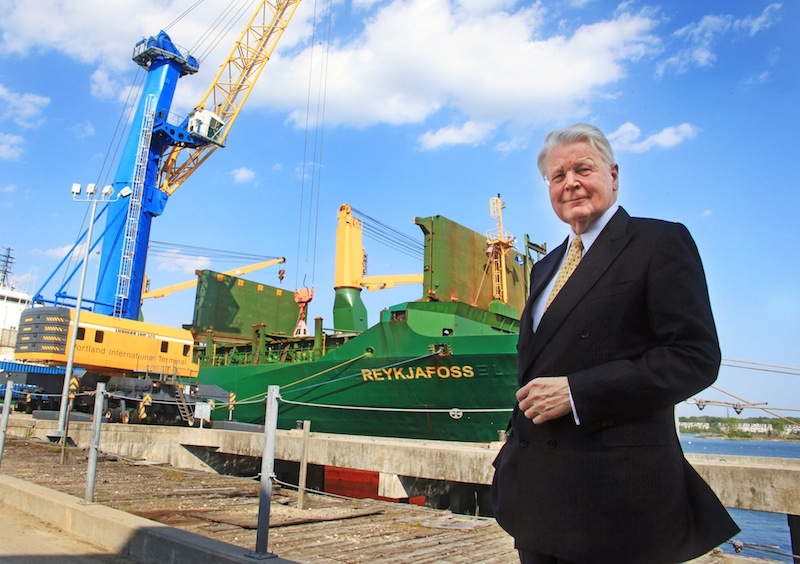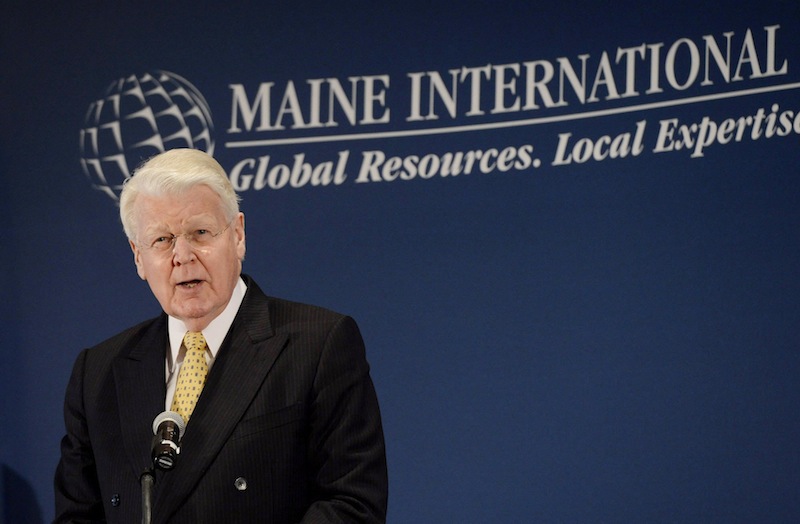SOUTH PORTLAND – While the melting of the Arctic icecap is an “unfortunate” reality because of climate change, Maine and Iceland stand to benefit economically when new shipping lanes emerge, Iceland’s president said Friday at Maine International Trade Day.
Maine will be part of that because the Icelandic shipping company Eimskip has made Portland its only U.S. port of call, said President Olafur Ragnar Grimmson, whose island nation is just south of the Arctic Circle.
“Iceland and Maine are strategically placed in this new global transportation system,” he said.
Grimsson was the keynote speaker at the annual event, held by the Maine International Trade Center at the Marriott Sable Oaks in South Portland.
A polar shipping route would shorten the trip between China and Europe by 40 percent to 50 percent, he said.
He noted that a Chinese icebreaker went to Iceland last year and came close to the North Pole on its journey.
Within the next 10 to 20 years, polar waters could be open for three or four months a year, said Grimmson, which would create a viable shipping route for those months.
“There is a new ocean opening on the planet Earth,” he said. “It’s a reality, whether we like it or not.”
Grimmson said the receding polar icecap will also make resources such as iron ore, gas and oil more accessible.
Grimmson came to Maine to show support for Eimskip, which has made Portland its North American hub for trans-Atlantic container service. It’s the first container service between Maine and Europe in 33 years,
Grimmson wants to make Iceland a trans-shipment hub, and Portland would be its link to the U.S. market.
Already, Eimksip is using Portland to ship freight, primarily frozen fish and glacial water, for customers as far away as Louisville, Ky., Houston and Los Angeles.
Grimsson noted that, a century ago, Portland was one of North America’s busiest ports because of its location. It was the closest ice-free port for much of Canada. He said the state now must focus on infrastructure upgrades, such as improved rail connections, to take advantage of its new opportunity.
Progress needs to be made in the “old-fashioned way,” he said. “You need to look at what you did 100 years ago to realize this is your new future.”
The Arctic Council, made up of the eight nations with territory in the Arctic, including the United States, will make critical policy decisions about the future of the polar region, Grimmson said.
Alaska is usually identified as the only state with an interest in the Arctic, but Maine is the “eastern pillar” for the U.S. strategy and must play a key role in the council when the United States assumes the role of chair in two years, he said.
Grimmson, 69, has been Iceland’s president since 1996. Elected by popular vote, the president serves as head of state and has little political power.
However, the president has the power to put a law passed by Iceland’s parliament to a referendum. Grimmson was the first president to use that power, refusing in 2004 to sign a law to create a government-controlled committee to regulate freedom of speech. The government withdrew the law before a referendum could be held.
In March, Eimskip moved its American port of call from Norfolk, Va., to Portland.
Eimskip specializes in moving freight in the high latitudes of the North Atlantic. With a fleet of 17 vessels, it delivers frozen fish and other products, including Icelandic water, lamb and aluminum, to North America.
In Europe, its ships call on ports in the United Kingdom, Norway and Russia, and stop in Rotterdam, Netherlands, Europe’s largest port.
Eimskip also takes provisions to the islands of Iceland, Greenland and Newfoundland.
Since March 13, Eimskip container ships have visited the port six times. The service is on pace to move 4,000 to 5,000 containers in a 12-month period, said Jack Humeniuk, a local representative of the International Longshoremen’s Association, the labor union representing workers at Portland’s International Marine Terminal.
Bragi Thor Marionosson, an Eimksip vice president in charge of operations in 17 countries, said the company has been focusing on serving its existing customers while moving its operations to Portland. The move to Portland has shortened travel time across the Atlantic, allowing the company to adjust schedules and add ports of call in Europe.
He said the company will soon focus its attention on developing new markets in the United States. From Portland, goods are transported to customers via truck or rail. Pan Am Railways, Maine’s largest railroad, provides rail service to the port and has connections to national railroads in the United States and Canada.
Whether trans-Arctic shipping lanes open up or not, Eimksip’s move to Portland will boost Maine’s economy by providing companies with a less expensive and more convenient way to ship goods to Europe.
“This is a game-changer for the New England transportation network,” said David Fink, president of Pam Am Railways, who attended a reception Friday afternoon at the International Marine Terminal.
John Henshaw, executive director of the Maine Port Authority, agrees with Grimmson that melting polar ice provides an opportunity for Maine.
“Primarily because Eimskip is here,” he said.
Tom Bell can be contacted at 791-6369 or at:
tbell@pressherald.com
Twitter: TomBellPortland
Send questions/comments to the editors.



